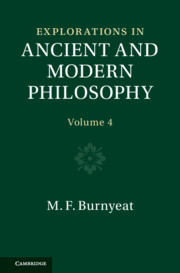Book contents
- Explorations in Ancient and Modern Philosophy
- Explorations in Ancient and Modern Philosophy
- Copyright page
- Contents
- Illustrations
- Preface
- Acknowledgements
- Abbreviations
- Introduction
- Part I Ontology and epistemology
- Part II Physics and optics
- Chapter 8 ΕΙΚΩΣ ΜΥΘΟΣ
- Chapter 9 Aristotle on the foundations of sublunary physics
- Chapter 10 Archytas and optics
- Chapter 11 ‘All the world’s a stage-painting’: scenery, optics, and Greek epistemology
- Bibliography
- Index locorum
Chapter 11 - ‘All the world’s a stage-painting’: scenery, optics, and Greek epistemology
from Part II - Physics and optics
Published online by Cambridge University Press: 24 March 2022
- Explorations in Ancient and Modern Philosophy
- Explorations in Ancient and Modern Philosophy
- Copyright page
- Contents
- Illustrations
- Preface
- Acknowledgements
- Abbreviations
- Introduction
- Part I Ontology and epistemology
- Part II Physics and optics
- Chapter 8 ΕΙΚΩΣ ΜΥΘΟΣ
- Chapter 9 Aristotle on the foundations of sublunary physics
- Chapter 10 Archytas and optics
- Chapter 11 ‘All the world’s a stage-painting’: scenery, optics, and Greek epistemology
- Bibliography
- Index locorum
Summary
Why would a fourth-century BC Atomist – Anaxarchus – express his scepticism about knowing the truth of things by imaging these as scene-painting? The comparison seems already to have been made by Democritus and Anaxagoras, who according to Vitruvius had been impressed by something an Athenian painter named Agatharchus had written on perspective. This chapter offers a detailed scrutiny of a range of texts that have a bearing on the interpretation of Vitruvius’ claim. It argues that Agatharchus was probably author of a pioneering treatise on stage-building, which included a section on scene-painting lauding its power to create the illusion of a whole three-dimensional world. Anaxagoras will have taken this claim as cue for his dictum: ‘Appearances are a sight of things unseen’ – in the sense that there is no break between the macroscopic world of ordinary observation and the microscopic world which explains it. The Atomist Democritus will no doubt have imparted a quite different spin to Anaxagoras’ slogan in praising it. But it is unlikely that either Presocratic was prompted to a mathematical interest in perspective by reading Agatharchus. It is only with the Hellenistic philosophers, and especially Epicurus, that optics begins to leave its trace on general epistemology.
Keywords
- Type
- Chapter
- Information
- Explorations in Ancient and Modern Philosophy , pp. 325 - 362Publisher: Cambridge University PressPrint publication year: 2022



